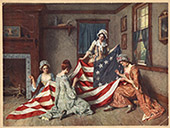Libraries, University of Nebraska-Lincoln
Document Type
Archival Material
Date of this Version
1776
Abstract
WILLIAM HENRY DRAYTON (1742–79), chief justice of South Carolina, Revolutionary leader, and wealthy plantation owner, was born near Charlestown. His family on both sides were wealthy planters and prominent politicians, enabling young William Henry to study in London and Oxford. Upon his return he married a South Carolina heiress, turned to politics, and was elected to the Assembly. Drayton championed the cause of British interest in the colonies and opposed such popular measures as the non-importation movement while defending the rights of the individual. Upon loosing his seat in the Assembly, Drayton left for England and returned shortly thereafter to sit on the Council of the province (1770–75), supported by relatives who served as Lt. Governor and members of the Council. If his appointment was largely the result of his loyalty to the Crown, Drayton made a complete turnabout during the political turmoil preceding the War of Independence. In 1774, he published A Letter from “Freeman” of South Carolina to the Deputies of North America, essentially arguing for a federal system and independent government in the American colonies while maintaining allegiance to the Crown.
Upon Drayton’s suspension in 1775, he joined the Revolutionary forces, recruited volunteers for armed resistance, and was elected president of South Carolina’s provincial Congress. In his elected position as chief justice (March 1776), he became a radical supporter of American Independence, advocated the adoption of his state’s constitution, and represented South Carolina as an elected member to the Continental Congress, where he served from late 1778 until his death a year later.
Drayton’s Charge on the Rise of the American Empire (1776)—here courtesy of the American Antiquarian Society—is an address to the Grand Jury of South Carolina at Charleston. Four months after the Declaration of Independence, Drayton enthusiastically outlines his Southern vision of the young United States in its progress toward becoming the next world empire.



Comments
The introductory note and the following text were published in The Kingdom, The Power, & The Glory: The Millennial Impulse in Early American Literature (Dubuque, Iowa: Kendall-Hunt, 1998), pp. 392–407. Copyright © 1998 Reiner Smolinski.